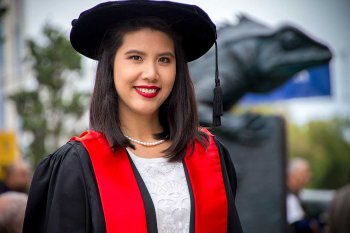
Dr Vuthijumnonk, who recently graduated with a Doctor of Philosophy in ManawatÅ«, examined the biological properties of blueberries, which she says could lower the chance of developing breast cancer. “Blueberries contain phytochemicals called anthocyanins which may be responsible for the health benefits of blueberries. They reduce free radicals in our system, decrease new blood vessel formation and increase the number of beneficial bacteria – all elements which help in the fight against breast cancer.”
During the study, blueberries were given to animals in either a liquid form or as a pomace (fibre included) supplemented diet form. Dr Vuthijumnonk says animals that consumed blueberries as part of their diet had a 50 per cent lower incidence rate of mammary tumours.
“Interestingly, tumours found in animals that received blueberries with their fibre included [pomace form], were smaller and less aggressive than in animals without blueberry intervention or in animals that received blueberry juice. We also found circulating estrogen – the steroid hormone which plays a key role in breast cancer promotion - was lower in animals that consumed the blueberry pomace supplemented diet. This shows that not only phytochemicals in blueberries play a key role for their health benefits, but the fibre in the fruits was also shown to play an important part.”
However, Dr Vuthijumnonk says it is important to remember that this work was done in an animal trial, and each animal responds to environmental stress differently. “Therefore, we can’t say eating blueberries will prevent breast cancer in humans. But we are able to say blueberry consumption may lower the risk of developing breast cancer at the population level.”
The 35 year-old, who hails from Thailand, would like to do further studies on the combined effect of blueberry consumption and traditional medicine. She also suggests the fruit should be investigated as a post-surgery supplement for breast cancer patients.
Dr Vuthijumnonk has been studying at Massey’s ManawatÅ« campus since 2011 and will return to Thailand next week. “I am going back to work as a lecturer at Rajamangala University of Technology Lanna in Chiang Mai. I hope to do more research on the health benefits of our local crops, such as rice, mulberriesand herbs such as Gymnema inodorum.”



 Classifieds
Classifieds

